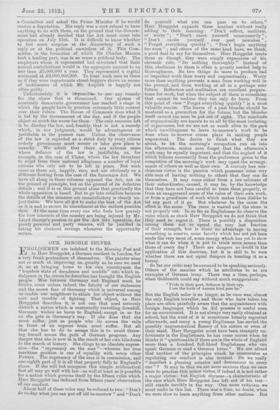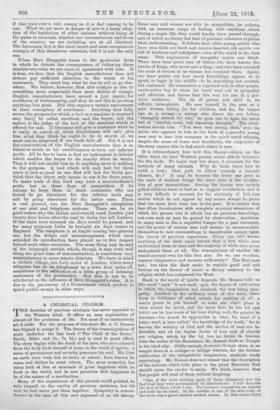OUR IGNOBLE SELVES. E NGLISHMEN are indebted to the Morning Post
and to Herr Herggelet, a German resident in London, for a very frank portraiture of themselves. The painter aims not so much at improving us, greatly as he sees we need it, as at bringing home to his own countrymen the " hopeless state of decadence and muddle" into which in- dulgence in the errors he describes has brought the English people. War between Germany and England must, be thinks, come unless, indeed, the fatuity of our statesmen and the secret fear of Germany which is universal among us enable our neighbour to attain her object without the cost and trouble of fighting. That object, as Herr Herggelet describes it, is not one that need seriously disturb a nation which is contentedly travelling downhill. Germany wishes no harm to England, except in so far as she gets in Germany's way. If she does that she must suffer, just as people who lie across the rails in front of an express train must suffer. But all that she has to do to escape this is to avoid throw- ing herself across the path of German progress. Any danger that she is now in is the result of her own blindness to the march of history. She clings to an obsolete expres- sion—the " supremacy on the seas "—whereas her true maritime position is one of equality with seven other Powers. The supremacy of the seas is in commission, and one-eighth part of it is all that properly falls to England's share. If she will but recognize this simple arithmetical fact all may go well with her—so well at least as is possible for a nation which governs itself by the fifteen rules which Herr Herggelet has deduced from fifteen years' observation of our conduct.
About half of these rules may be reduced to two: "Don't do to-day what you can put off till to-morrow " and "Don't do yourself what you can pass on to others." Herr Herggelet expands these maxims without really adding to their meaning : " Don't reflect, meditate, or worry " ; " Don't exert yourself unnecessarily " ; " Don't excite yourself over past mistakes " ; " Forget everything quickly "; " Don't begin anything too soon " ; and others of the same kind have, we think, a good deal to say for themselves. Herr Herggelet treats them as though they were simply expansions of his eleventh rule, " Do nothing thoroughly." Instead of this, obedience to them is often a greatly needed help to thoroughness. No two things do more to produce bad or imperfect work than worry and unpunctuality. Worry more than anything prevents a man from working well in the present., and from working at all in a perhaps near future. Reflection and meditation are excellent prepara- tions for work, but when the subject of them is something that cannot be undone they can only do harm. From this point of view " Forget everything quickly " is a most valuable maxim. The lesson of a past blunder should be mastered as a precaution for the future, but the blunder itself cannot too soon be put out of sight. The mischiefs of unpunctuality are known to us all by the most irritating of experiences, but we are not so much alive to the part which unwillingness to leave to-morrow's work to be done when to-morrow comes plays in making people unpunctual. The desire to finish what they are about, to let the morning's occupation run on into the afternoon, makes men forget that the afternoon's work may be equally important, and that the neglect of it which follows necessarily from the preference given to the completion of the morning's work may upset the arrange- ments of others as well as their own. A scarcely less mis- chievous virtue is the passion which possesses some very able men of leaving nothing to others that they can do themselves. It may come either from a low estimate of their subordinates, caused, it may be, by the knowledge that they have not been careful to train them properly, or from an exaggerated sense of the value of their own work, or from a greediness of work which makes them dislike to let any part of it go. But whatever be the cause the effect is the same. The razor is wasted and the stone is not properly cut. In so far as Englishmen do observe the rules which so shock Herr Herggelet we do not think that they need to regret it. There is possibly a disposition among them not to spend the very last fraction of their strength, but is there no advantage in having something in reserve, some faculty which has not yet been made the very most of, some energy which has yet to show what it can do when it is put to trials more severe than those of every day ? There are dangers no doubt in the application of this doctrine, but it is still to be seen whether there are not equal dangers in treating it as a heresy.
So far our critic may be assumed to be speaking seriously. Others of the maxims which he attributes to us are examples of German irony. There was a time, perhaps, when Goldsmith could say without much exaggeration :
" Pride in their port, defiance in their eye, I see the lords of human kind pass by."
But the English milor is no longer, as he once was, almost the only English traveller, and those who have taken his place are often painfully aware that the acquaintance with foreign languages which he did possess is useful even for an excursionist. It is not always very easily obtained at school, but the want of it is sometimes bitterly regretted afterwards, and many a young Englisman has envied the possibly ungrammatical fluency of his sisters or even of their maid. Herr Herggelet must have been strangely un- fortunate in the Englishmen he has come across when he thinks it " questionable if there are in the whole of England more than a hundred full-blood Englishmen who can speak German or read a German letter." We are afraid that another of the principles which he enumerates as regulating our conduct is also ironical. Do we really " manifest a pleasing exterior and demeanour to every ono " ? It may be that we are more anxious than we once were to practise this minor virtue, if indeed it is not rather a major virtue ; but English shyness—a characteristic of the race which Herr Herggelet has left out of his test— still stands terribly in the way. One more criticism we must make in this list. There was a time, no doubt, when we were slow to learn anything from other nations. But
if this wore ever a rule among us it is fast ceasing to be one. What we are more in danger of now is a hasty adop- tion of the legislation of other nations without being at the pains to ascertain whether our circumstances and those of the country we are imitating are at all identical. The Insurance Act is the most recent and most conspicuous example of this disastrous omission, but it is not the only ene.
When Herr Herggelet turns to the particular form in which ho detects the consequences of following these mischievous rules we are more in agreement with him. It is true, we fear, that the English manufacturer does not always pay sufficient attention to the wants of his customers. They must buy what he has to sell or go else- where. We believe, however, that this mistake is due to something more respectable than mere dislike of change. English manufacturers have earned a just repute for excellence of workmanship, and they do not like to produce anything less good. But this argues a certain narrowness in their conception of excellence. Anything that fully serves the purpose for which a tool or a machine is required may fairly be called excellent, and the buyer, not the maker, is the judge of the tool or the machine which is offered for sale. If Germans will give a customer what he is really in search of, while Englishmen will only give him what they think he ought to be in search of, we must not be surprised if our trade falls off. But it is not the conservatism of the English manufacturer that is to blame so much as his unwillingness to turn out inferior goods. All he has to learn is that no instrument is inferior which enables the buyer to do exactly what he wants. That it will not enable him to do anything more is nothing to the purpose. A tool which will only last for three years is just as good as one that will last for thirty pro- vided that the buyer only means to use it for three years. To make tools of this kind may hurt a manufacturer's pride, but in these days of competition if he refuses to keep them in stock customers who are forced to go elsewhere for the inferior tools may end by going elsewhere for the better ones. There is real ground, too, for Herr Herggelet's complaints of our post and telephone systems. There can be no good reason why the Indian mail should reach London just twenty-four hours after the mail to India has loft London. If the dates were reversed six days would be gained, and for many purposes India be brought six days nearer to England. The telephone is at length coming into general use, but the delays and mismanagement which have attended its introduction have placed us in this respect behind most other countries. The same thing may be said of the telegraph service, which, though it may work well along the great lines of communication, is sometimes very unsatisfactory in more remote districts. We have in mind a certain village, not forty miles of London, where every telegram has to be telephoned to a town four miles off, sometimes to the edification of a little group of listening customers of the postmaster. But this is not to be attributed to the influence of Herr Herggelet's rules. It is due to the parsimony of a Government which prefers to spend public money in other ways.











































 Previous page
Previous page